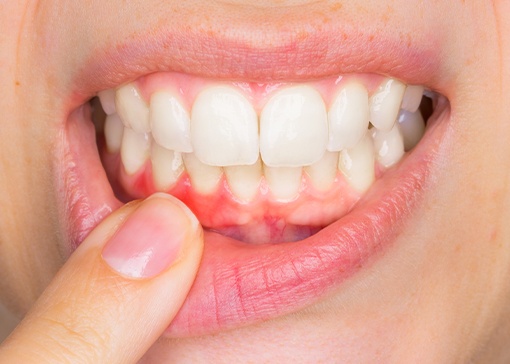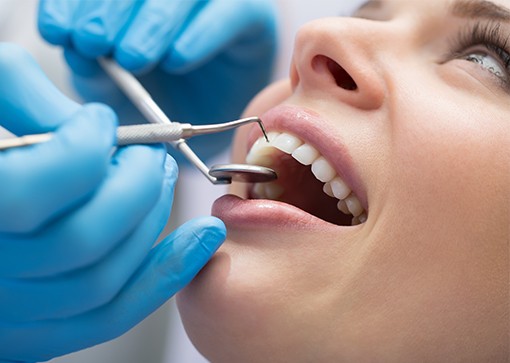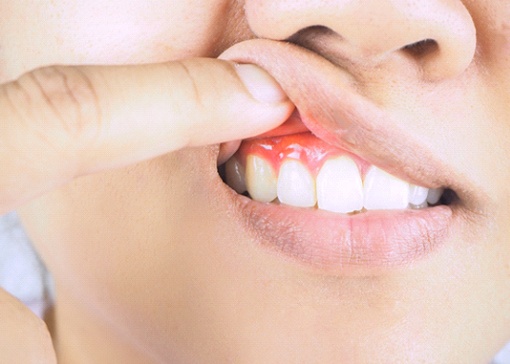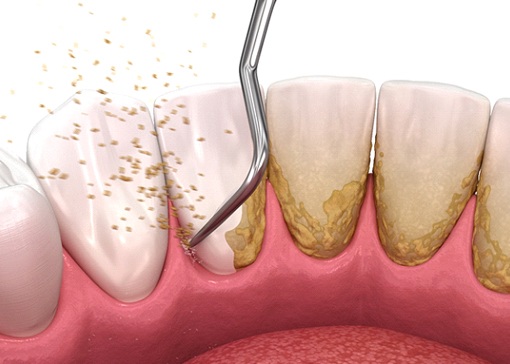Gum Disease Treatment – North Andover, MA
Save Your Gums, Save Your Smile
Gum disease generally doesn’t get as much attention as cavities, but it’s the most prevalent disease in America. In fact, it’s more common than heart disease, stroke, and cancer. A vast majority of the population (roughly 80%) suffers from a form of gum disease. This condition is also sometimes referred to as periodontal disease. No matter what you call it, however, it’s essential that you get in touch with Dr. Beliveau as soon as possible, so a solution can be found through effective gum disease treatment in North Andover.
Why Choose E. Charles Beliveau, DDS for Gum Disease Treatment?
- Over 20 Years of Dental Experience
- State-of-the-Art Technology
- Quick, Efficient Deep Cleanings
What is Gum Disease?

Gum disease is an oral infection that starts off mild and becomes more severe as you age. The root cause is normally when plaque underneath the gum line hardens and becomes calculus (which can’t be removed by brushing or flossing). The calculus starts to irritate the soft tissues in your mouth, leaving them vulnerable to infection. This issue can easily be exacerbated by poor oral hygiene and a buildup of food particles between your teeth.
Many patients don’t recognize the comparatively mild symptoms early on, which include swollen gums and bleeding while brushing their teeth. Over time, the gums will start to pull back from the teeth, allowing periodontal pockets to form. If bacteria build up in these pockets, they can destroy the gum tissue and bone that anchor your teeth in place.
Why is Gum Disease so Serious?

Gum disease has been linked to several health problems, including those affecting the entire body and not just the mouth. If you have gum disease, you’ll also be at greater risk for stroke, heart disease, various respiratory problems, complications from diabetes, osteoporosis, low birth weight (in the case of pregnant women), and even dementia.
The connection between gum disease and these various conditions is being actively studied, but overall, the link makes sense. If bacteria are in your mouth, they can easily travel to other parts of your body by being inhaled or swallowed. In some cases, they might even enter your bloodstream via the vessels in your gums.
Symptoms of Gum Disease

The only way to know if you have gum disease is by scheduling an appointment with our team. However, here are some common signs and symptoms you can look out for:
- Persistent oral sores
- Chronic bad breath
- Red, swollen, or bleeding gums
- Gum recession
- Difficulty with chewing
- Noticeable changes in your bite
How Do We Treat Gum Disease?

It’s important to note that advanced periodontal disease is not curable – we can only try and control it to stop it from spreading. That said, preventing the damage from spreading further is relatively simple if we catch it early on during a regular dental checkup. At that point, you may only need to change your brushing technique or update your flossing routine.
After gum disease reaches a certain point (beyond the stages where improved oral hygiene is enough to reverse it), we have a few options for treating it. A deep cleaning that consists of scaling and root planing is generally the first choice. That said, particularly advanced changes might require surgery from a periodontist. We can refer you to one of our trusted colleagues if needed. No matter what kind of treatment you receive, you should plan on more frequent hygiene visits moving forward.
Scaling & Root Planing

According to the Centers for Disease Control and Prevention, it has been recently reported that one out of every two adults in the United States has gum disease. Luckily, you can have peace of mind knowing that this serious oral health problem is treatable thanks to scaling and root planing in North Andover. You can learn more by reading on or reaching out to our team!
Do I Need Scaling & Root Planing?

In the early stages, gum disease may be reversible with improved brushing and flossing habits. However, if symptoms progress, you may require scaling and root planing. Make an appointment with your dentist if you experience bleeding gums while brushing, red or swollen gums, persistent bad breath, plaque along the gumline, or receding gums.
The Process of Scaling & Root Planing

Our goal as your dental team is to help you maintain, restore, and enhance your smile throughout the years. If your oral health is compromised by moderate gum disease, we can intervene with scaling and root planing to help reverse the symptoms.
To do this, Dr. Beliveau will remove all the plaque and tartar that has accumulated along your gumline and the surface of your teeth. From there, the roots will be cleaned, which is the root planing portion of the procedure. Depending on the stage of your gum disease, this process can be completed in one or two appointments.
Aftercare Tips for Scaling & Root Planing

It may take a few weeks for your gums to fully heal after scaling and root planing. To minimize sensitivity and discomfort, try the following:
- Rinse with warm salt water regularly
- Brush and floss gently
- Avoid spicy, acidic, hot, or cold foods
- Follow a soft diet for at least 48 hours post-treatment
